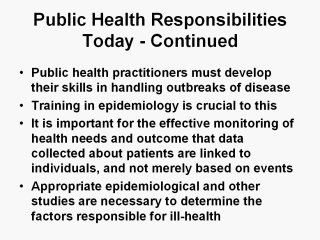| front |1 |2 |3 |4 |5 |6 |7 |8 |9 |10 |11 |12 |13 |14 |15 |16 |17 |18 |19 |20 |21 |22 |23 |24 |25 |26 |27 |review |
 |
Public health
practitioners must develop their skills in handling outbreaks of disease and
the law must be updated to clarify these responsibilities and ensure that
they are accompanied by the necessary powers to act. Training in
epidemiology is crucial to this. They need to develop the essential links
with microbiology and toxicological laboratories, so important in this task,
but must also be appropriately trained in these disciplines to be able to
assess and use this expertise to best effect. Defined responsibilities in
this require explicit organizational links and adequate powers to
investigate and control any outbreak. For this function, appropriate methods
of disease surveillance, including notification are essential. Thus public health has key needs in the collection, analysis and dissemination of accurate information. It follows that it should have a major role in the design and establishment of appropriate information systems. It is important for the effective monitoring of health needs and outcome that data collected about patients are linked to individuals, and not merely based on events. Methods of record linkage which respect confidentiality pioneered in Oxford and Cumbernauld should become the norm, as they are in countries such as Sweden and Denmark. Although unique patient numbers were promised for introduction in the United Kingdom in 1996, they have yet to become a reality, apart from in Scotland where linked data in the form of CHI numbers is in routine use. Their information is central to more effective use of data systems in health care. Responsibility for the assessment of health and its maintenance implies the requirement to determine the factors responsible for ill-health. Public health must be involved in appropriate studies, whether epidemiological, sociological, psychological, or statistical, which enable hypotheses to be tested and solutions implemented for the control of ill health. Its major role is in the identification, and planning of appropriate methods of intervention, to correct deficiencies and prevent the occurrence of disease. This must be a multi-disciplinary activity. In purely medical terms however, roles can and should be distinguished. The role of public health in the surveillance, identification, planning and co-ordination of measures to prevent, if possible, the occurrence of disease, and to deal with it if it does occur, is central to the specialty. The implementation of appropriate preventive, curative and rehabilitative measures is the responsibility of clinicians, in both hospital and general practice. There is thus a clear distinction in the roles of public health and clinical medicine in this context. Public health identifies a problem and co-ordinates the service; general practitioners or hospital clinicians provide whatever treatment or management is appropriate. If these distinctions are recognized many of the factors causing friction will be removed or at least modified. The different knowledge and expertise of different medical specialties - and their inevitable overlap - must be acknowledged and respected if effective collaboration is to be achieved. |